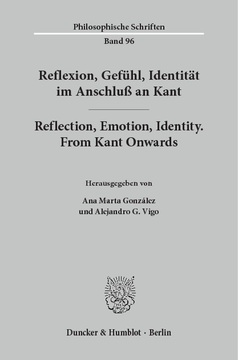Reflexion, Gefühl, Identität im Anschluß an Kant / Reflection, Emotion, Identity. From Kant Onwards

BOOK
Cite BOOK
Style
Format
Reflexion, Gefühl, Identität im Anschluß an Kant / Reflection, Emotion, Identity. From Kant Onwards
Editors: González, Ana Marta | Vigo, Alejandro G.
Philosophische Schriften, Vol. 96
(2019)
Additional Information
Book Details
Pricing
About The Author
Ana Marta González (PhD1998). Scientific Director of the Institute for Culture and Society at the University of Navarra, her research explores the intersection between moral philosophy and social sciences. Her publications include: Practical identity, obligation and sociality (JSP 2018), The Pending Revolution: Kant as a Moral Revolutionary (Filosofija.Sociologija 2017), Emoción, sentimiento y pasión en Kant (Trans-Form-Açao 2015), La filosofía kantiana como filosofía de la cultura (Isegoría 2014), Kant’s philosophy of education (JPE 2011), Culture as mediation. Kant on nature, culture and morality (Georg Olms 2011), Kant and a culture of freedom (ARSP 2010), Kant's contribution to social theory (Kant Studien 2009).Alejandro G. Vigo (PhD1993 Heidelberg). Professor of Philosophy at the Department of Philosophy, University of Navarra, his teaching and research interests embrace Ancient Greek Philosophy (Plato and Aristotle), Kant, Phenomenology (Husserl and Heidegger), Hermeneutics (Gadamer) and Classical and Contemporary Theories of Practical Rationality. His publications on Kant include: Determinación y reflexión (Anuario Filosófico 2004), Reflexión y juicio (Diánoia 2006), Conceptos trascendentales, reflexión y juicio (Diánoia 2008), Kategoriale Synthesis und Einheit des Bewusstseins (R. Enskat [Hg.], Kants Theorie der Erfahrung, Berlin – New York 2015, p. 169-199), Contingencia y finalidad. Kant y la perspectiva reflexiva sobre la naturaleza (Open Insight 2017).Abstract
The present collection brings together a number of studies interested in highlighting the role of reflexivity and sentiment in Kant’s philosophy. If philosophy is by definition a reflective endeavor, Kant’s writings document a particularly powerful philosophical enterprise; not only because he constitutes reflexivity itself into the cornerstone of philosophical method, but also because, in doing so, he unveils fundamental structures of human subjectivity.Authors in this volume have succeeded in highlighting how Kant’s commitment to reflexivity represents a privileged gateway of exploring the complexity and richness of human experience. Aesthetic and moral experiences are particularly eloquent in this regard: aesthetic and moral sentiments represent for Kant a particular site of human reflexivity, which bring to light a specifically human world, marked by different kinds of normativity, in the midst of which humans actually live.
Table of Contents
| Section Title | Page | Action | Price |
|---|---|---|---|
| Inhaltsverzeichnis | 5 | ||
| Ana Marta González/Alejandro G. Vigo: Introduction. Sentiment and Reflexivity: Kantian approaches to the unfolding of the human world | 7 | ||
| Christel Fricke: Reflective sentimentalism in Aesthetics: Hume’s Question and Kant’s Answer | 9 | ||
| References | 26 | ||
| Soledad García Ferrer: Revolutionary Happiness: On the complicated relationship between Ethics and Politics in Kant | 27 | ||
| I. The Copernican Turn of Happiness | 28 | ||
| II. Politics and Revolutionary Happiness | 33 | ||
| III. Conclusion | 39 | ||
| Ana Marta González: A Kantian avenue towards Korsgaard’s notion of “practical identity”: Kant on humanity and culture | 41 | ||
| I. Kant and Korsgaard on identity and humanity | 42 | ||
| II. The meanings of “humanity” in Kant’s practical philosophy | 48 | ||
| III. Homo phaenomenon and homo noumenon | 57 | ||
| IV. A Kantian insight into Korsgaard’s notion of practical identity: from the animal rationabile to the animal rationale | 65 | ||
| V. Concluding remarks | 68 | ||
| References | 69 | ||
| Alba Jiménez: Die Metabasen der Begierde und das Gesetzliche: Die Falte des Gefühls als Triebfeder der Moral | 71 | ||
| I. Der differentiale Charakter des Gefühls | 71 | ||
| II. Projektionen einer Gefühlslehre im Bereich der Moral | 73 | ||
| III. Gefühl als Bewegungsgrund der Moral | 76 | ||
| VI. Gefühl und praktische Anwendung | 80 | ||
| V. Das Gefühl als Schlussstein der Staats- und Rechtslehre | 84 | ||
| IV. Schlussbemerkungen | 88 | ||
| Abkürzungen der zitierten Werke Kants | 90 | ||
| Nuria Sánchez Madrid: Kants Theorie der Klugheit: Eine interaktive Auffassung der Handlung? | 91 | ||
| I. Kant und die pragmatische Normativität | 93 | ||
| II. Die Aktualität Kants moralischer Anthropologie | 97 | ||
| III. Die affektive Grundlage der pragmatischen Orientierung | 100 | ||
| IV. Schlussbemerkung | 102 | ||
| Sekundärliteratur | 104 | ||
| Alejandro G. Vigo: Reflektierte Wahrnehmung. Kant und der reflexive Weg zur Befreiung des Gefühls | 105 | ||
| I. Einleitung | 105 | ||
| II. Reflektierte Wahrnehmung | 106 | ||
| III. Neutralisierung und Freiheit des Gefühls | 110 | ||
| IV. Schlußbemerkung | 117 | ||
| Mariano Crespo: Phenomenology, Feelings and Identity. How Husserl’s Phenomenology of Feelings Contributes to the Problem of Personal Identity | 119 | ||
| I. | 119 | ||
| II. | 121 | ||
| References | 129 | ||
| Autorenverzeichnis/List of Contributors | 131 |
